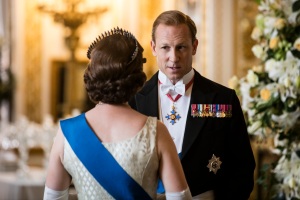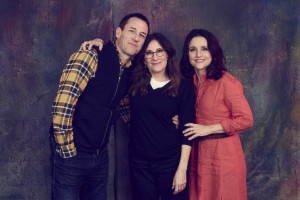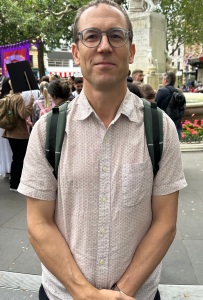EXCLUSIVE: Tobias Menzies was hiding in plain sight at a rally held by UK actors union Equity in support of its sister union SAG-AFTRA.
Cameras and microphones were being shoved in front of the likes of Brian Cox, Imelda Staunton, Jim Carter, Hayley Atwell, David Oyelowo, Naomie Harris and many others, but Menzies was just out of shot.
Had Menzies been wearing a bespoke suit, shirt, tie and nice polished shoes, the penny might have dropped for some in the media scrum.
He won an Emmy for his portrayal of Prince Philip in Seasons 3 and 4 of Netflix and Left Bank Pictures’ The Crown.
Then there’s Nicole Holofcener’s sharply observed — satisfyingly so — arch comedy You Hurt My Feelings, which is in theaters but hits Prime Video on August 8. Menzies sports an American accent in that, with not a hint of his proper received pronunciation.
On Friday he was speaking in the voice of solidarity “to support SAG-AFTRA and the strike they’re on. It feels like a really important point and moment in our industry.”
In fact, he’s a member of that organization too, and he’s actually on strike as well.
Menzies has stopped working on Joseph Kosinski’s Formula One movie Apex, which until last week he’d been filming with the picture’s star, Brad Pitt.
“They’re not shooting with any SAG actors, so I’m stood down,” he told me.
“Brad is on strike too,” he added.
Tobias Menzies at the Equity rally in London in support of the SAG-AFTRA strike (Baz Bamigboye/Deadline)
“I’m not able to work, and that’s right and proper. Again, I’m a lucky person in that in the immediate future it doesn’t affect me,” but he’s in solidarity, he explained, “for the people who are working paycheck to paycheck. … That’s what unions are about. It’s about the collective and the group, not the individual.
“It’s a necessary fight,” he continued, as he raised a fist.
I’d recognized Menzies in an instant because I’m familiar with his everyday look. The glasses, short-sleeved shirt,chinos, sometimes worn with a blazer. I spot him in theater foyers all over town. He has a voracious appetite for plays and likes to see as much as time allows when he’s in London.
Ten days ago, ahead of the actors dispute, we had lunch at a pub near his home in Tufnell Park, a district in north London, a couple of miles up the road from Camden Town.
The place was practically empty as we ordered meatballs and salad — that is until Neil Kinnock, who led the UK’s Labour Party before Tony Blair’s New Labour took over.
Kinnock’s sitting three tables behind Menzies, but he’s facing me.
The actor can hear Kinnock’s Welsh tones but is unaware that it’s him until he gets up and bids me farewell and spots the famous politician.
Later we giggle like schoolboys about the “sighting.”
Menzies is every inch an Englishman, which makes what he does in Holofcener’s movie all the more remarkable, so completely does he assume the mantle of Don, an Upper West Side shrink married to Beth, a published author played effortlessly by Julia Louis-Dreyfus.
The plot boils down to Beth overhearing Don telling her brother-in-law that he’s only pretending to love the new book Beth has written. When she hears about it … well, you can imagine.
Their marriage wobbles while they attempt to unravel the truth of Don’s comments.
It comes down to trust.
Menzies has a few people “who are kind of confidants” who he can go, ”Listen, can you give me your straight answer?” when you want it. “But those people are quite hard to come by, aren’t they — those people you really trust?”
At the theater, he said, “people start talking about the writing or the scenery or whatever, and you go, ”OK, so they didn’t love it.” And it’s like, “It’s OK .What are you going to do?”
Well, I head for the exit the minute the curtain drops ‘cause my mush is usually a road map to what I think of something.
The actor’s sympathetic. ”How do you navigate it? It must be hard in your job,” he said.
Trust has been established, so I tell him about the disappointing stage revival I’d watched the previous evening.
I like that he didn’t pounce on my tale with any evident glee. He asks constructive questions as we try to fathom why the piece hadn’t worked. ”I remember being blown away by that original production. It was so fine,” he says admiringly.
He was working as an usher at the National Theater at the time. Strange as it may sound, I recall spotting him when he worked there because I’d seen him in something he’d done when he studied at the Royal Academy of Dramatic Art, where his contemporaries were Maxine Peake and Sally Hawkins.
Later he worked with Hawkins in director Adrian Shergold’s 2007 TV movie adaptation of Jane Austen’s Persuasion, and he starred opposite Peake in an Oxford Theatre Company touring production of John Arden’s 1959 play Serjeant Musgrave’s Dance, An Un-historical Parable.
With his posh-sounding accent, it’s easy to assume that he might come from an aristocratic monied background. His laugh instantly dispelled that notion. “I really don’t. No. I’m sort of no-money, hippie London scene. Yeah.”
His father was a radio producer at the BBC. ”I mean, ’70s London was a pretty alternative place. And my parents were definitely in the middle of all of that.”
His parents separated when he was 6 and his mum brought up “me and my brother”
Laughing, he explains: “Yeah, I’m culturally rich. There was a lot of books and a lot of theater and a lot of music. But no, there was often not much money around.”
He was schooled in the Steiner system, which aims to develop a lifelong love of learning and strong moral and ethical capacities to build resilience. “I guess it was kind of a liberal childhood” he explains, saying his school provided him with “a broad curriculum and I think they’re very minded to try and develop all aspects of a child, be it that kind of social development as well as just the academics.”
It was “pretty formative, and I had a great time in it,” he tells me.
He was the beneficiary of a grant that paid his fees when he won a place at RADA. ”And if that hadn’t been the case, I wouldn’t have been able to get in. I wouldn’t have been able to go. And I think that is an issue for kids that are coming from backgrounds where they don’t have the money to pay for stuff.”
It worries him because “it may well be that the representation of less affluent and more working-class backgrounds is diminishing. And if that’s the case, I think that’s a loss. I think our arts have to be diverse in terms of its representation of all different types of class and cultures and skin colors.”
That’s a funding and a political issue, he says, adding that he was pleased when he heard current Labour Party leader — and possible future Prime Minister — Sir Keir Starmer speak out in support of the arts “and he wasn’t just saying what we wanted to hear, he meant it.”
Along with ushering at the National Theatre, Menzies also cleaned fridges at a branch of Marks and Spencer’s food hall every morning, among other menial jobs. “It keeps you honest,” he says, smiling. “It’s good. You know the worth of a pound.
“No, cleaning is a very honorable profession, he adds. “It’s oddly meditative. It’s like, you sort of get it done.”
We then remarked how his queen on The Crown was portrayed by Olivia Colman (The Favourite, The Night Manager, in which they both had roles) loved her cleaning gigs.

Menzies with Olivia Colman in ‘The Crown’ (Netflix)
Obviously, Holofcener’s had seen his work in The Crown and the Aisling Bea comedy This Way Up, which also starred Bea and Sharon Horgan.
Menzies has an organic sense of comedy timing that is shown to shining effect in This Way Up and You Hurt My Feelings.
The comedy in Holofcener’s film is really rooted and not performative.
Menezies admitted that “hanging onto” Louis-Dreyfus’ “coattails” helped locate his funny bone, and they worked at ensuring the jokes emerged out of a situation.
In any case, Holofcener’s would “just tell us to play it straight “ if they veered too broad “or if we were too self-aware.”
Holofcener found him a coach to help with the East Coast accent, and “I definitely listened to the people around me,” he says.
The funny thing about accents, he says, “is that, in a way, it’s the same technique as learning to do Prince Philip. … It’s just a set of sounds, and you just have to sort of get them into your muscles.”

From left: Tobias Menzies, Nicole Holofcener and Julia Louis-Dreyfus
Michael Buckner for Deadline
A big part of what had drawn him to play Don was because “he’s definitely much more sort of a beta male, he’s more vulnerable. And obviously I played a lot of alpha characters, from even someone like Philip in The Crown and obviously stuff like Outlander. And so it was really fun to change. Obviously the material’s very different playing an American and then playing someone who’s much less in control and is sort of slightly lost.”
RELATED: Brad Pitt Attends British Grand Prix To Film Scenes For Apple Formula One Film
He plays a Brit in Apex and was at the Silverstone motor race circuit where real Formula One drivers were mixed in with the film’s drivers and drivers. ”I’ve never been to a Grand Prix before …and then trying to film in the middle of it was fantastic.”
There were cameras in cars trying to create the thrill of the race. He wasn’t in a driving seat, and he is duty bound not to speak of his role in the movie.
There’s still a lot he has to learn about screen acting, he says. ”And I want to keep learning.”
Menzies enjoyed working with Louis-Dreyfus. “That was really impressive, to see her, how she does it. And now I’ve gotten a chance to see how someone like Brad Pitt negotiates this kind of film, big-action sports film. Super interesting.”
In between the Holofcener’s and the Kosinski movies, he portrayed Edwin Stanton, Abraham Lincoln’s secretary of war, in the Apple limited series Manhunt.
At some point, though, once all his filming commitments are done, he would like to return to the stage.
First up would be The Hunt, a scorching play by David Farr (The Night Manager, Spooks) based on the acclaimed Danish film The Hunt directed by Thomas Vinterberg from a screenplay by Vinterberg and Tobias Lindholm.
It played at London’s Almeida Theatre in the summer of 2019, directed by Rupert Goold (Judy).
“So, we might try and bring that back,” he said hopefully.
The producer Sonia Friedman (Funny Girl, Leopoldstadt, The Inheritance) had intended to transfer The Hunt into the West End, but the pandemic got in the way.
Menzies has fingers crossed that The Hunt could get a run at a West End theater and a season at St. Ann’s Warehouse in Brooklyn, though nothing is set in stone.
It’s a ferociously powerful drama “about cancellation, about someone being kind of beyond the pale and being sort of ostracized by the group … and toxic masculinity.”

